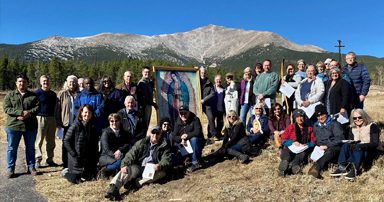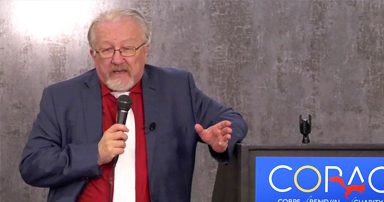My favorite professor in college was Clarence VerSteeg. He was an expert on the American Revolution and our class was a sort of mini-seminar. It was limited to 15 students and met once a week for four straight hours each week. Professor VerSteeg made two big impressions on me. First, no one ever knew what his political persuasion was. It didn’t matter. You could posit any theory you liked, but you had better be able to back it up under intense questioning, from both classmates and the professor. If you showed solid reasoning, a firm foundation of facts, and adequate depth, you did well. If not, you flunked – and no pandering was possible. Second, he did not give a minimum number of pages for assignments; he gave a maximum number. He would tell us that we needed to learn to write with concision – and that we would only need such and such number of pages to adequately explore a particular aspect of a subject. If you really needed more, you could ask permission – with the warning that every word had better tell. He grimaced at the thought of turning out students who wrote 90 percent fluff and stuff.
For our final paper, he allowed us ten pages. I had to go see him and seek permission for 12. After the usual warning, he grimly allowed it. To my delight, I got an A+ on that paper, the only one he gave for that class.
My thesis was that the American Revolution was not a revolution at all, but a counter-revolution. A revolution seeks to overthrow the existing order. The American colonists had largely been self-governing, save for the taxes they sent to England for well over a century. When England realized what a cash cow they had in America and how much potential those colonies had, The King and much of Parliament started tightening the screws down. It was the British who sought to change the existing order without any form of consent from the governed. The American Revolutionaries fought to preserve the way they had long governed themselves, resisting the revolutionary efforts of the British to make them all serfs of England.
Sound familiar? Our modern American Revolutionaries truly do seek to overthrow the way we govern ourselves – and they have taken us right up to the brink with edicts from an army of unaccountable bureaucrats that have the force of law and from judges who imagine themselves to be philosopher kings rather than the humbler role the Constitution should confine them to. Legislators have largely taken on the ceremonial role of court jesters who are empowered to enrich themselves by feeding off the substance of the people they are supposed to serve. Donald Trump began a counter-revolution to restore things to their proper order, where the people hold the whip hand and all functionaries of the self-governing state are accountable to the people rather than vice-versa.
Viva la counter-revolucion!
*********
I sometimes speak of “first things,” fundamental principles that cannot be broken down further into constituent parts – and can serve to guide us in all situations, whether familiar or unfamiliar. Being able to properly identify what are actually first things is critical, for if you get it wrong you will perpetually have your cart before your horse – and things don’t work.
The first time this concept seared through my mind with real force was in 1975 when the Helsinki Accords were signed. This repugnant document sought to apologize for Soviet brutality to its own citizens by acknowledging that America grants its citizens political rights while the Soviet Union granted its citizens economic rights. I was both astonished and furious that America would sign on to such a formulation. Besides the obvious fact that the average American citizen was at least an order of magnitude more prosperous than the average Soviet citizen (whose economic rights were “guaranteed”), this formulation got the whole concept of rights entirely wrong. Rights do not emanate from any government; they precede the very existence of any state. States can grant entitlements; only God can grant rights – and the test of the legitimacy of any government is whether it acknowledges and defends those rights. I wrote a letter to some paper saying that the proper American response to that formulation should have been, “You are mistaken, gentlemen. Our government grants us nothing. We are a free, sovereign people who grant some limited power to our government to facilitate social and economic commerce and mutual defense.” The whole episode shook me, for I took it as an article of faith that senior government officials knew better than I how things should work. I was to get ample evidence in subsequent years that that was not the case; that most high officials were not sufficiently informed, bright or honorable enough to be safely entrusted with a seat on their local county board.
When I was in media – and particularly radio, those spots near every election telling everyone to vote, no matter how little attention they had paid, irked me to no end. I hated them. When in print media I could ignore them. In broadcast, I had to play them.
So I did a commentary taking that banal recommendation apart. First, I noted that voting is not the essence of free democracy, but one of its consequences – a residue, as it were. The essence of free democracy is to protect the fundamental rights of all. Its function is to prevent two foxes and a chicken from voting for what is for supper and having the majority rule. The duty of the inhabitants of such a state is to keep themselves sufficiently engaged that they can make informed decisions (which are not always the same thing as smart decisions, but at least make the effort). If everyone, no matter how ignorant or uninformed goes in and randomly chooses names they don’t know, we might as well just choose officials by lot. I added that the majority can never licitly rule over the intrinsic rights of any person. I ended by saying that if listeners had made a reasonable effort to keep up with what various candidates had done and proposed, by all means please go vote regardless of how much or how little they agreed with me. But if they had not paid any attention at all, please do us all a favor and stay home.
In 2006, I was doing two Congressional campaigns – and spent a lot of time in Washington with the Republican delegation. At the Capitol Hill Club (the Republicans’ clubhouse, as it were), I was appalled at how many apparent conservatives constantly lamented that if we could just set aside the social issues for a few cycles, we could put all things right by concentrating on economics and policy wonk stuff. I constantly and vehemently argued to the contrary; that if we didn’t get the social issues right we could never get things right at all, including economically. Leftist social policy requires that we do things that do not come naturally, that we pretend that reality and human nature are malleable. It is an artificial construct – and to sustain it requires both big government and big cash to give incentive to perversities that people would never accept in a natural state. I was regarded as a shrewd strategist and tactician, so my colleagues indulged me. They largely thought I was a crank on this subject – but a crank useful in other ways. One high operative I was friends with once jokingly told me he could not decide whether I was the most ideological pragmatist he had ever met or the most pragmatic ideologue. We both laughed. But leaders on the right continued to put the cart before the horse and now we are faced with an existential battle to see if a free, self-governing nation can be recovered and survive.
Imagine how delighted I was to see Dr. Jeff Mirus, the founder of Christendom College and Trinity Communications, get right to the heart of what ails so many of our left-wing clerics. It is a form of materialism, focusing on using our human ingenuity to give the good things the Gospels promise while shunting Christ and His commands to the background. But that is not what Scripture and the Magisterium teaches. What it teaches is that we should seek first the Kingdom of God and His righteousness, and all these things shall be added unto us. These good things the lefties say they want are the consequences of genuine devotion to God and His Kingdom. Making them the substance of our endeavor not only keeps them ever beyond our grasp, but perverts and mutilates any portion of them that we ever actually get. Modern elites occupy themselves in two ways: shooting all the horses then wondering why the carts never get anywhere.
No matter how humble our little cart and horse, if we get the sequence right, we will leave the ignorant “experts” who rule today in our dust – and perhaps inspire them to take a fresh look at their own thinking.
*********
This story of how a social media company voided its contract with the Family Research Council just an hour before a major event was to be broadcast confirms my judgment that the thugs in high tech are determined to shut down all Christian and conservative rights of assembly and speech in the most damaging way they can leading up to election. May all these bums be sued into bankruptcy after this is over.
*********
On Monday of this week, I did a video-taping with our own MP, which he has cut up into a three part series for our Youtube Channel. You get the exclusive look at Part I: An In-Depth look at the Corps of Renewal and Charity (CORAC), what its all about, why it is being launched now, and how you can help and participate. Each segment will first be introduced here and then uploaded to the CORAC Channel.




















0 Comments